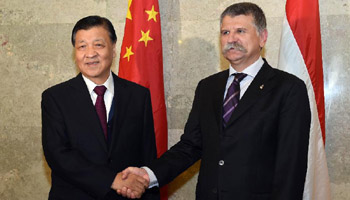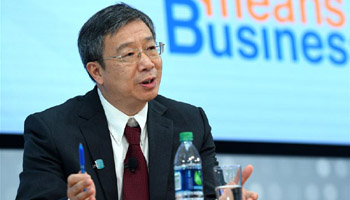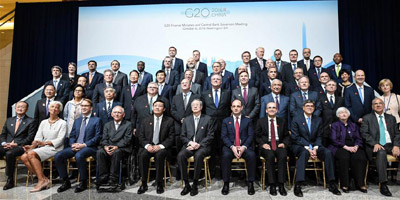![[SPOTLIGHT]U.S.-NEW YORK-PRESIDENTIAL DEBATE](135736144_14758252591601n.jpg)
Democrat Hillary Clinton (R) and Republican Donald Trump attend their first presidential debate in Hempstead of New York, the United States, Sept. 26, 2016. Hillary Clinton and Donald Trump on Monday held their first presidential debate in Hempstead. (Xinhua/Qin Lang)
WASHINGTON, Oct. 6 (Xinhua) -- With a strong sentiment of dissatisfaction with both presidential nominees, Donald Trump and Hillary Clinton, voting of the 2016 general elections becomes, for many Americans, more like a campaign to stop one candidate instead of showing support for the other.
The underlying reason for the dilemma facing the U.S. society runs far beyond the harsh rhetoric of Trump or the trust issue of Clinton that continues to turn a large number of voters away, and lies in the grassroots frustration with the collaboration between political and business elites, which undermines U.S. democracy.
Despite widespread plea to curb rampant contribution in U.S. politics, little has been done and as a result, U.S. democracy and together with it Americans' confidence in politicians are corroded.
In the country, 42 percent of adults rate dealing with the money in politics a top priority for President and Congress, according to a January survey by the Pew Research Center, up from 28 percent four years ago.
The influence of the wealthy on politics, though long-standing, emerged as one of the key issues in this year's presidential campaign.
Former Democratic candidate Bernie Sanders, by making this a central campaign theme, gained considerable support from people who believe the system is rigged against them.
Billions of U.S. dollars from the wealthiest were already flooding the political process, said Sanders during the primary season, calling the campaign finance system "corrupt."
Trump has also criticized the influence of large campaign contributions in his run for the White House. The billionaire real estate mogul repeatedly said that traditional politicians, like his rival Clinton, can be bought.
In an apparent move to woo disgruntled liberals who adamantly supported Sanders, political veteran Clinton in her acceptance speech for Democratic presidential nomination in July vowed to overturn U.S. Supreme Court's 2010 Citizens United ruling that opened the door to unlimited donation in U.S. politics and to strengthen regulations of Wall Street banks and big corporations.
"I believe that our economy isn't working the way it should because our democracy isn't working the way it should," said Clinton, whose close ties with Wall Street has been scrutinized during the year-long campaign.
Ironically, Clinton is the one in this election cycle that benefits much from big money in U.S. politics.
After the 2010 Citizens United ruling, the U.S. Supreme Court again in 2014 loosened restrictions on campaign financing, striking down the previous limits on the total amount of donations one person could make to all federal candidates and parties in an election cycle.
With the limits gone, Clinton could ask her richest donors to contribute more than before to the Hillary Victory Fund, a joint fundraising committee for Clinton's campaign, and the national and state committees for Democrats.
According to The New York Times, just 250 wealthy donors gave 44 million dollars to the Hillary Victory Fund during the past year.
To defend the fact of outplaying her Republican rival in raking in big money donation, Clinton's excuse is hardly tenable.
According to the Times, a spokesman for the Clinton campaign said that in order to achieve the goal of imposing restrictions on campaign money, "the only way to achieve them was to elect more Democrats who shared her views."
Former President Jimmy Carter told a radio program last year that the United States is now an "oligarchy" in which "unlimited political bribery" has created "a complete subversion of our political system as a payoff to major contributors."
It is a shame that Carter's warnings appeared to have fallen on deaf ears.










